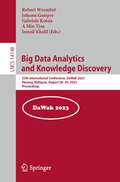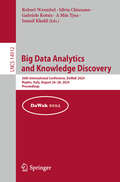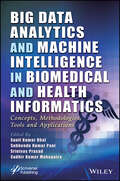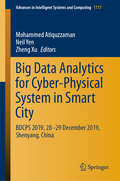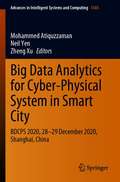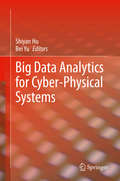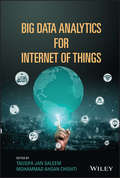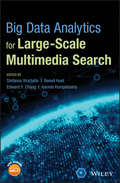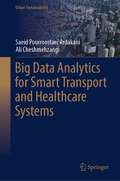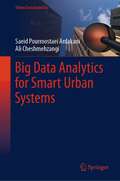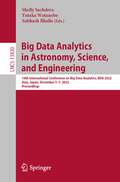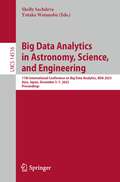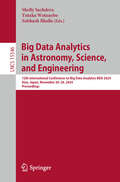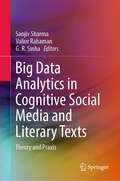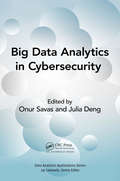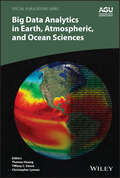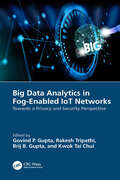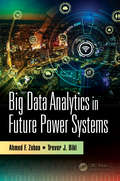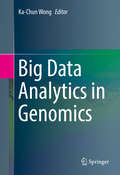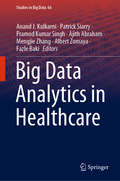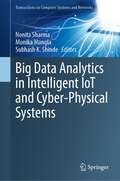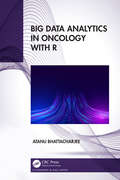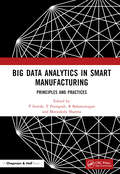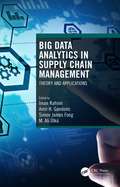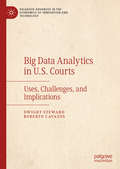- Table View
- List View
Big Data Analytics and Knowledge Discovery: 25th International Conference, DaWaK 2023, Penang, Malaysia, August 28–30, 2023, Proceedings (Lecture Notes in Computer Science #14148)
by Ismail Khalil A Min Tjoa Johann Gamper Robert Wrembel Gabriele KotsisThis book constitutes the proceedings of the 25th International Conference on Big Data Analytics and Knowledge Discovery, DaWaK 2023, which took place in Penang, Malaysia, during August 29-30, 2023. The 18 full papers presented together with 19 short papers were carefully reviewed and selected from a total of 83 submissions. They were organized in topical sections as follows: Data quality; advanced analytics and pattern discovery; machine learning; deep learning; and data management.
Big Data Analytics and Knowledge Discovery: 26th International Conference, DaWaK 2024, Naples, Italy, August 26–28, 2024, Proceedings (Lecture Notes in Computer Science #14912)
by Ismail Khalil A Min Tjoa Robert Wrembel Silvia Chiusano Gabriele KotsisThis book constitutes the proceedings of the 26th International Conference on Big Data Analytics and Knowledge Discovery, DaWaK 2024, which too place in Naples, Italy, during August 26-28, 2024. The 16 full and 20 short papers included in this book were carefully reviewed and selected from 83 submissions. They were organized in topical sections as follows: Modeling and design; entity matching and similarity; classification; machine learning methods and applications; time series; data repositories;optimization; and data quality and applications.
Big Data Analytics and Machine Intelligence in Biomedical and Health Informatics: Concepts, Methodologies, Tools and Applications (Advances in Intelligent and Scientific Computing)
by Subhendu Kumar Pani Srinivas Prasad Sudhir Kumar Mohapatra Sunil Kumar DhalBIG DATA ANALYTICS AND MACHINE INTELLIGENCE IN BIOMEDICAL AND HEALTH INFORMATICS Provides coverage of developments and state-of-the-art methods in the broad and diversified data analytics field and applicable areas such as big data analytics, data mining, and machine intelligence in biomedical and health informatics. The novel applications of Big Data Analytics and machine intelligence in the biomedical and healthcare sector is an emerging field comprising computer science, medicine, biology, natural environmental engineering, and pattern recognition. Biomedical and health informatics is a new era that brings tremendous opportunities and challenges due to the plentifully available biomedical data and the aim is to ensure high-quality and efficient healthcare by analyzing the data. The 12 chapters in??Big Data Analytics and Machine Intelligence in Biomedical and Health Informatics??cover the latest advances and developments in health informatics, data mining, machine learning, and artificial intelligence. They have been organized with respect to the similarity of topics addressed, ranging from issues pertaining to the Internet of Things (IoT) for biomedical engineering and health informatics, computational intelligence for medical data processing, and Internet of Medical Things??(IoMT). New researchers and practitioners working in the field will benefit from reading the book as they can quickly ascertain the best performing methods and compare the different approaches. Audience Researchers and practitioners working in the fields of biomedicine, health informatics, big data analytics, Internet of Things, and machine learning.
Big Data Analytics for Cyber-Physical System in Smart City: BDCPS 2019, 28-29 December 2019, Shenyang, China (Advances in Intelligent Systems and Computing #1117)
by Mohammed Atiquzzaman Zheng Xu Neil YenThis book gathers a selection of peer-reviewed papers presented at the first Big Data Analytics for Cyber-Physical System in Smart City (BDCPS 2019) conference, held in Shengyang, China, on 28–29 December 2019. The contributions, prepared by an international team of scientists and engineers, cover the latest advances made in the field of machine learning, and big data analytics methods and approaches for the data-driven co-design of communication, computing, and control for smart cities. Given its scope, it offers a valuable resource for all researchers and professionals interested in big data, smart cities, and cyber-physical systems.
Big Data Analytics for Cyber-Physical System in Smart City: BDCPS 2020, 28-29 December 2020, Shanghai, China (Advances in Intelligent Systems and Computing #1303)
by Mohammed Atiquzzaman Zheng Xu Neil YenThis book gathers a selection of peer-reviewed papers presented at the second Big Data Analytics for Cyber-Physical System in Smart City (BDCPS 2020) conference, held in Shanghai, China, on 28–29 December 2020. The contributions, prepared by an international team of scientists and engineers, cover the latest advances made in the field of machine learning, and big data analytics methods and approaches for the data-driven co-design of communication, computing, and control for smart cities. Given its scope, it offers a valuable resource for all researchers and professionals interested in big data, smart cities, and cyber-physical systems.
Big Data Analytics for Cyber-Physical Systems
by Bei Yu Shiyan HuThis book highlights research and survey articles dedicated to big data techniques for cyber-physical system (CPS), which addresses the close interactions and feedback controls between cyber components and physical components. The book first discusses some fundamental big data problems and solutions in large scale distributed CPSs. The book then addresses the design and control challenges in multiple CPS domains such as vehicular system, smart city, smart building, and digital microfluidic biochips. This book also presents the recent advances and trends in the maritime simulation system and the flood defence system.
Big Data Analytics for Internet of Things
by Mohammad Ahsan Chishti Tausifa Jan SaleemThis book provides a thorough overview of all the aspects of data analytics in IoT systems including need for data analytics, computing platforms, big data analytical tools, data compression and storage, privacy and security etc. It includes discussions of ways to extract valuable insights from Big Data with the help of techniques like Regression, K-Nearest Neighbor, Decision tree, Support Vector Machine, Naïve Bayes, Clustering, Deep Neural Networks etc. The book explains the techniques that are suitable for digging out the best decisions from large amounts of IoT data to gain control of IoT devices. Moreover, the book offers novel designs for IoT systems covering applications like smart homes, smart healthcare, smart transportation, smart manufacturing, smart grid, smart agriculture, smart education, and smart government. The book discusses all aspects of IoT data analytics including presently available strategies as well as loopholes in those strategies and new solutions.
Big Data Analytics for Large-Scale Multimedia Search
by Benoit Huet Edward Y. Chang Stefanos Vrochidis Ioannis KompatsiarisA timely overview of cutting edge technologies for multimedia retrieval with a special emphasis on scalability The amount of multimedia data available every day is enormous and is growing at an exponential rate, creating a great need for new and more efficient approaches for large scale multimedia search. This book addresses that need, covering the area of multimedia retrieval and placing a special emphasis on scalability. It reports the recent works in large scale multimedia search, including research methods and applications, and is structured so that readers with basic knowledge can grasp the core message while still allowing experts and specialists to drill further down into the analytical sections. Big Data Analytics for Large-Scale Multimedia Search covers: representation learning, concept and event-based video search in large collections; big data multimedia mining, large scale video understanding, big multimedia data fusion, large-scale social multimedia analysis, privacy and audiovisual content, data storage and management for big multimedia, large scale multimedia search, multimedia tagging using deep learning, interactive interfaces for big multimedia and medical decision support applications using large multimodal data. Addresses the area of multimedia retrieval and pays close attention to the issue of scalability Presents problem driven techniques with solutions that are demonstrated through realistic case studies and user scenarios Includes tables, illustrations, and figures Offers a Wiley-hosted BCS that features links to open source algorithms, data sets and tools Big Data Analytics for Large-Scale Multimedia Search is an excellent book for academics, industrial researchers, and developers interested in big multimedia data search retrieval. It will also appeal to consultants in computer science problems and professionals in the multimedia industry.
Big Data Analytics for Smart Transport and Healthcare Systems (Urban Sustainability)
by Ali Cheshmehzangi Saeid Pourroostaei ArdakaniThis book aims to introduce big data solutions in urban sustainability applications—mainly smart transportation and healthcare systems. It focuses on machine learning techniques and data processing approaches which have the capacity to handle/process huge, live, and complex datasets in real-time transportation and healthcare applications. For this, several state-of-the-art data processing approaches including data pre-processing, classification, regression, and clustering are introduced, tested, and evaluated to highlight their benefits and constraints where data is sensitive, real-time, and/or semi-structured.
Big Data Analytics for Smart Urban Systems (Urban Sustainability)
by Ali Cheshmehzangi Saeid Pourroostaei ArdakaniBig Data Analytics for Smart Urban Systems aims to introduce Big data solutions for urban sustainability smart applications, particularly for smart urban systems. It focuses on intelligent big data which takes the benefits of machine learning to analyse large and rapidly changing datasets in smart urban systems. The state-of-the-art Big data analytics applications are presented and discussed to highlight the feasibility of big data and machine learning solutions to enhance smart urban systems, smart operations, urban management, and urban governance. The key benefits of this book are, (1) to introduce the principles of machine learning-enabled big data analysis in smart urban systems, (2) to present the state-of-the-art data analysis solutions in smart management and operations, and (3) to understand the principles of big data analytics for smart cities and communities. Endorsements‘Over the many years of collaboration between academia and industry, we noticed the common language is ‘big data’; with that, we have developed novel ideas to bridge the gaps and help promote innovation, technologies, and science’.- Tian Tang, Independent Researcher, China ‘Big Data Analytics is a fascinating research area, particularly for cities and city transformations. This book is valuable to those who think vigorously and aim to act ahead’.- Li Xie, Independent Researcher, China‘For urban critiques, knowledge trains aspiring opportunities toward outstanding manifestations. Smartness has evolved or/ advanced rambunctious & embracing realities along (with) novel directions and nurturing integrated city knowledge’.- Aaron Golden, SELECT Consultants, UK
Big Data Analytics in Astronomy, Science, and Engineering: 10th International Conference on Big Data Analytics, BDA 2022, Aizu, Japan, December 5–7, 2022, Proceedings (Lecture Notes in Computer Science #13830)
by Subhash Bhalla Shelly Sachdeva Yutaka WatanobeThis book constitutes the proceedings of the 10th International Conference on Big Data Analytics, BDA 2022, which took place in a hybrid mode during December 2022 in Aizu, Japan.The 14 full papers included in this volume were carefully reviewed and selected from 70 submissions. They were organized in topical sections as follows: big data analytics, networking, social media, search, information extraction, image processing and analysis, spatial, text, mobile and graph data analysis, machine learning, and healthcare.
Big Data Analytics in Astronomy, Science, and Engineering: 11th International Conference on Big Data Analytics, BDA 2023, Aizu, Japan, December 5–7, 2023, Proceedings (Lecture Notes in Computer Science #14516)
by Shelly Sachdeva Yutaka WatanobeThis book constitutes the proceedings of the 11th International Conference on Big Data Analytics in Astronomy, Science, and Engineering, BDA 2023, which took place in Aizu, Japan during December 5–7, 2023. The 19 full papers included in this book were carefully reviewed and selected from 55 submissions. They were organized in topical sections as follows: Data management and visualization; data science: architectures and systems; data science and applications; and cyber systems and information security.
Big Data Analytics in Astronomy, Science, and Engineering: 12th International Conference on Big Data Analytics, BDA 2024, Aizu, Japan, November 26–28, 2024, Proceedings (Lecture Notes in Computer Science #15546)
by Subhash Bhalla Shelly Sachdeva Yutaka WatanobeThis book constitutes the proceedings of the 12th International Conference on Big Data Analytics in Astronomy, Science, and Engineering, BDA 2024, which took place in Aizu, Japan during November 26-28, 2024. The 16 full papers included in this book were carefully reviewed and selected from 90 submissions; the proceedings also include 6 invited papers. The contributions were organized in topical sections as follows: Big Data: analysis and management; data science; big data applications; and information security.
Big Data Analytics in Cognitive Social Media and Literary Texts: Theory and Praxis
by G. R. Sinha Sanjiv Sharma Valiur RahamanThis book provides a comprehensive overview of the theory and praxis of Big Data Analytics and how these are used to extract cognition-related information from social media and literary texts. It presents analytics that transcends the borders of discipline-specific academic research and focuses on knowledge extraction, prediction, and decision-making in the context of individual, social, and national development. The content is divided into three main sections: the first of which discusses various approaches associated with Big Data Analytics, while the second addresses the security and privacy of big data in social media, and the last focuses on the literary text as the literary data in Big Data Analytics. Sharing valuable insights into the etiology behind human cognition and its reflection in social media and literary texts, the book benefits all those interested in analytics that can be applied to literature, history, philosophy, linguistics, literary theory, media & communication studies and computational/digital humanities.
Big Data Analytics in Cybersecurity (Data Analytics Applications)
by Onur Savas Julia DengBig data is presenting challenges to cybersecurity. For an example, the Internet of Things (IoT) will reportedly soon generate a staggering 400 zettabytes (ZB) of data a year. Self-driving cars are predicted to churn out 4000 GB of data per hour of driving. Big data analytics, as an emerging analytical technology, offers the capability to collect, store, process, and visualize these vast amounts of data. Big Data Analytics in Cybersecurity examines security challenges surrounding big data and provides actionable insights that can be used to improve the current practices of network operators and administrators. Applying big data analytics in cybersecurity is critical. By exploiting data from the networks and computers, analysts can discover useful network information from data. Decision makers can make more informative decisions by using this analysis, including what actions need to be performed, and improvement recommendations to policies, guidelines, procedures, tools, and other aspects of the network processes. Bringing together experts from academia, government laboratories, and industry, the book provides insight to both new and more experienced security professionals, as well as data analytics professionals who have varying levels of cybersecurity expertise. It covers a wide range of topics in cybersecurity, which include: Network forensics Threat analysis Vulnerability assessment Visualization Cyber training. In addition, emerging security domains such as the IoT, cloud computing, fog computing, mobile computing, and cyber-social networks are examined. The book first focuses on how big data analytics can be used in different aspects of cybersecurity including network forensics, root-cause analysis, and security training. Next it discusses big data challenges and solutions in such emerging cybersecurity domains as fog computing, IoT, and mobile app security. The book concludes by presenting the tools and datasets for future cybersecurity research.
Big Data Analytics in Earth, Atmospheric, and Ocean Sciences (Special Publications)
by Thomas Huang Tiffany C. Vance Christopher LynnesApplying tools for data analysis to the rapidly increasing volume of data about the Earth An ever-increasing volume of Earth data is being gathered. These data are &“big&” not only in size but also in their complexity, different formats, and varied scientific disciplines. As such, big data are disrupting traditional research. New methods and platforms, such as the cloud, are tackling these new challenges. Big Data Analytics in Earth, Atmospheric, and Ocean Sciences explores new tools for the analysis and display of the rapidly increasing volume of data about the Earth. Volume highlights include: An introduction to the breadth of big earth data analytics Architectures developed to support big earth data analytics Different analysis and statistical methods for big earth data Current applications of analytics to Earth science data Challenges to fully implementing big data analytics The American Geophysical Union promotes discovery in Earth and space science for the benefit of humanity. Its publications disseminate scientific knowledge and provide resources for researchers, students, and professionals.
Big Data Analytics in Fog-Enabled IoT Networks: Towards a Privacy and Security Perspective
by Brij B. Gupta Rakesh Tripathi Govind P. Gupta Kwok Tai ChuiThe integration of fog computing with the resource-limited Internet of Things (IoT) network formulates the concept of the fog-enabled IoT system. Due to a large number of IoT devices, the IoT is a main source of Big Data. A large volume of sensing data is generated by IoT systems such as smart cities and smart-grid applications. A fundamental research issue is how to provide a fast and efficient data analytics solution for fog-enabled IoT systems. Big Data Analytics in Fog-Enabled IoT Networks: Towards a Privacy and Security Perspective focuses on Big Data analytics in a fog-enabled-IoT system and provides a comprehensive collection of chapters that touch on different issues related to healthcare systems, cyber-threat detection, malware detection, and the security and privacy of IoT Big Data and IoT networks. This book also emphasizes and facilitates a greater understanding of various security and privacy approaches using advanced artificial intelligence and Big Data technologies such as machine and deep learning, federated learning, blockchain, and edge computing, as well as the countermeasures to overcome the vulnerabilities of the fog-enabled IoT system.
Big Data Analytics in Future Power Systems
by Ahmed F. Zobaa Trevor J. BihlPower systems are increasingly collecting large amounts of data due to the expansion of the Internet of Things into power grids. In a smart grids scenario, a huge number of intelligent devices will be connected with almost no human intervention characterizing a machine-to-machine scenario, which is one of the pillars of the Internet of Things. The book characterizes and evaluates how the emerging growth of data in communications networks applied to smart grids will impact the grid efficiency and reliability. Additionally, this book discusses the various security concerns that become manifest with Big Data and expanded communications in power grids. Provide a general description and definition of big data, which has been gaining significant attention in the research community. Introduces a comprehensive overview of big data optimization methods in power system. Reviews the communication devices used in critical infrastructure, especially power systems; security methods available to vet the identity of devices; and general security threats in CI networks. Presents applications in power systems, such as power flow and protection. Reviews electricity theft concerns and the wide variety of data-driven techniques and applications developed for electricity theft detection.
Big Data Analytics in Genomics
by Ka-Chun WongThis contributed volume explores the emerging intersection between big data analytics and genomics. Recent sequencing technologies have enabled high-throughput sequencing data generation for genomics resulting in several international projects which have led to massive genomic data accumulation at an unprecedented pace. To reveal novel genomic insights from this data within a reasonable time frame, traditional data analysis methods may not be sufficient or scalable, forcing the need for big data analytics to be developed for genomics. The computational methods addressed in the book are intended to tackle crucial biological questions using big data, and are appropriate for either newcomers or veterans in the field. This volume offers thirteen peer-reviewed contributions, written by international leading experts from different regions, representing Argentina, Brazil, China, France, Germany, Hong Kong, India, Japan, Spain, and the USA. In particular, the book surveys three main areas: statistical analytics, computational analytics, and cancer genome analytics. Sample topics covered include: statistical methods for integrative analysis of genomic data, computation methods for protein function prediction, and perspectives on machine learning techniques in big data mining of cancer. Self-contained and suitable for graduate students, this book is also designed for bioinformaticians, computational biologists, and researchers in communities ranging from genomics, big data, molecular genetics, data mining, biostatistics, biomedical science, cancer research, medical research, and biology to machine learning and computer science. Readers will find this volume to be an essential read for appreciating the role of big data in genomics, making this an invaluable resource for stimulating further research on the topic.
Big Data Analytics in Healthcare (Studies in Big Data #66)
by Ajith Abraham Patrick Siarry Albert Zomaya Anand J. Kulkarni Mengjie Zhang Pramod Kumar Singh Fazle BakiThis book includes state-of-the-art discussions on various issues and aspects of the implementation, testing, validation, and application of big data in the context of healthcare. The concept of big data is revolutionary, both from a technological and societal well-being standpoint. This book provides a comprehensive reference guide for engineers, scientists, and students studying/involved in the development of big data tools in the areas of healthcare and medicine. It also features a multifaceted and state-of-the-art literature review on healthcare data, its modalities, complexities, and methodologies, along with mathematical formulations. The book is divided into two main sections, the first of which discusses the challenges and opportunities associated with the implementation of big data in the healthcare sector. In turn, the second addresses the mathematical modeling of healthcare problems, as well as current and potential future big data applications and platforms.
Big Data Analytics in Intelligent IoT and Cyber-Physical Systems (Transactions on Computer Systems and Networks)
by Monika Mangla Nonita Sharma Subhash K. ShindeThis book explores the complete system perspective, underlying theories, modeling, and applications of cyber-physical systems (CPS). Considering the interest of researchers and academicians, the editors present this book in a multidimensional perspective covering CPS at breadth. It covers topics ranging from discussion of rudiments of the system and efficient management to recent research challenges and issues. This book is divided into four sections discussing the fundamentals of CPS, engineering-based solutions, its applications, and advanced research challenges. The contents highlight the concept map of CPS including the latest technological interventions, issues, challenges, and the integration of CPS with IoT and big data analytics, modeling solutions, distributed management, efficient energy management, cyber-physical systems research, and education with applications in industrial, agriculture, and medical domains. This book is of immense interest to those in academia and industry.
Big Data Analytics in Oncology with R
by Atanu BhattacharjeeBig Data Analytics in Oncology with R serves the analytical approaches for big data analysis. There is huge progressed in advanced computation with R. But there are several technical challenges faced to work with big data. These challenges are with computational aspect and work with fastest way to get computational results. Clinical decision through genomic information and survival outcomes are now unavoidable in cutting-edge oncology research. This book is intended to provide a comprehensive text to work with some recent development in the area. Features: Covers gene expression data analysis using R and survival analysis using R Includes bayesian in survival-gene expression analysis Discusses competing-gene expression analysis using R Covers Bayesian on survival with omics data This book is aimed primarily at graduates and researchers studying survival analysis or statistical methods in genetics.
Big Data Analytics in Smart Manufacturing: Principles and Practices
by T Poongodi Meenakshi Sharma P Suresh B BalamuruganThe significant objective of this edited book is to bridge the gap between smartmanufacturing and big data by exploring the challenges and limitations. Companiesemploy big data technology in the manufacturing field to acquire data about the products.Manufacturing companies could gain a deep business insight by tracking customer details,monitoring fuel consumption, detecting product defects, and supply chain management.Moreover, the convergence of smart manufacturing and big data analytics currently suffersdue to data privacy concern, short of qualified personnel, inadequate investment, long-termstorage management of high-quality data. The technological advancement makes the datastorage more accessible, cheaper and the convergence of these technologies seems to bemore promising in the recent era. This book identified the innovative challenges in theindustrial domains by integrating heterogeneous data sources such as structured data,semi-structures data, geo-spatial data, textual information, multimedia data, socialnetworking data, etc. It promotes data-driven business modelling processes by adoptingbig data technologies in the manufacturing industry. Big data analytics is emerging as apromising discipline in the manufacturing industry to build the rigid industrial dataplatforms. Moreover, big data facilitates process automation in the complete lifecycle ofproduct design and tracking. This book is an essential guide and reference since itsynthesizes interdisciplinary theoretical concepts, definitions, and models, involved insmart manufacturing domain. It also provides real-world scenarios and applications,making it accessible to a wider interdisciplinary audience. Features The readers will get an overview about the smart manufacturing system which enables optimized manufacturing processes and benefits the users by increasing overall profit. The researchers will get insight about how the big data technology leverages in finding new associations, factors and patterns through data stream observations in real time smart manufacturing systems. The industrialist can get an overview about the detection of defects in design, rapid response to market, innovative products to meet the customer requirement which can benefit their per capita income in better way. Discusses technical viewpoints, concepts, theories, and underlying assumptions that are used in smart manufacturing. Information delivered in a user-friendly manner for students, researchers, industrial experts, and business innovators, as well as for professionals and practitioners.
Big Data Analytics in Supply Chain Management: Theory and Applications
by Iman Rahimi, Amir H. Gandomi, Simon James Fong, and M. Ali ÜlküIn a world of soaring digitization, social media, financial transactions, and production and logistics processes constantly produce massive data. Employing analytical tools to extract insights and foresights from data improves the quality, speed, and reliability of solutions to highly intertwined issues faced in supply chain operations.From procurement in Industry 4.0 to sustainable consumption behavior to curriculum development for data scientists, this book offers a wide array of techniques and theories of Big Data Analytics applied to Supply Chain Management. It offers a comprehensive overview and forms a new synthesis by bringing together seemingly divergent fields of research. Intended for Engineering and Business students, scholars, and professionals, this book is a collection of state-of-the-art research and best practices to spur discussion about and extend the cumulant knowledge of emerging supply chain problems.
Big Data Analytics in U.S. Courts: Uses, Challenges, and Implications (Palgrave Advances in the Economics of Innovation and Technology)
by Dwight Steward Roberto CavazosThis Palgrave Pivot identifies the key legal, economic, and policy issues surrounding the allowance to use and interpret electronic data consistently and in a scientifically valid manner in U.S. courts. Evidence based on the analysis of large amounts of electronic data ("Big Data") plays an increasing role in civil court disputes, providing information that could not have been obtained from a witness stand. While Big Data evidence presents opportunities, it also presents legal and public policy challenges and concerns. How can one be sure that deviations found in Big Data fall outside the norm? If statistical analyses can be conducted and presented different ways, how can judges and juries make sense of conflicting interpretations? When does Big Data extraction stop being investigative and instead become an invasion of privacy? This book traces the history of Big Data use in U.S. courts, couples current case studies with legal challenges to explore key controversies, and suggests how courts can change the way they handle Big Data to ensure that findings are statistically significant and scientifically sound.
